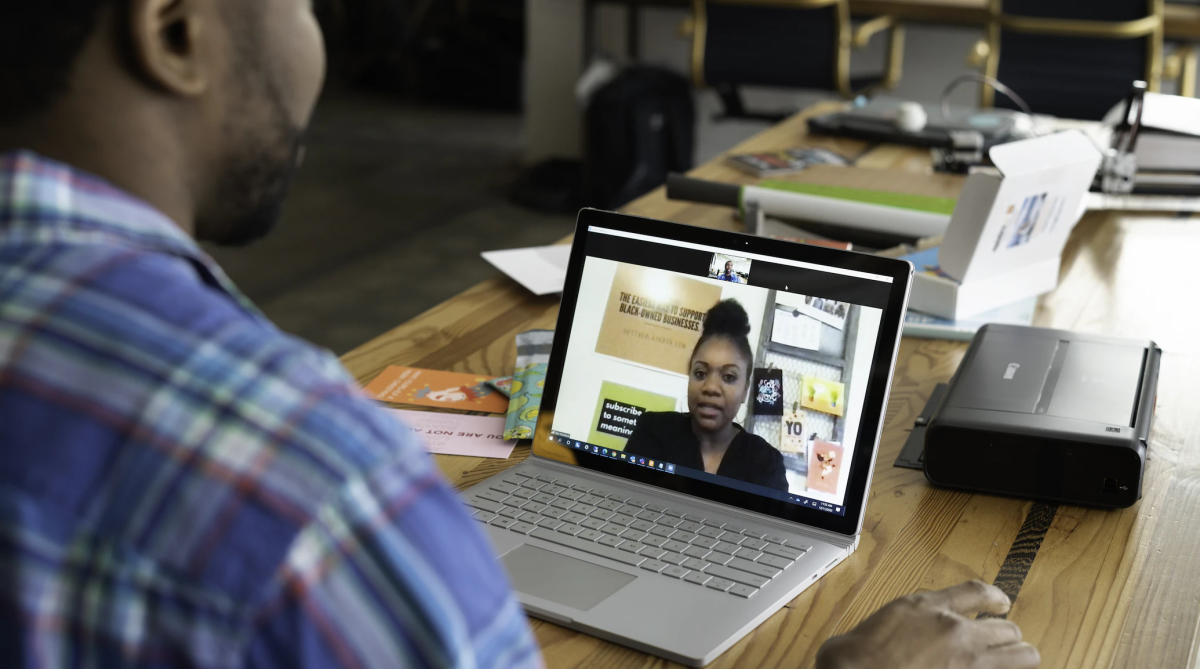Tell me about yourself.

This question doesn’t require a complete autobiography – rather just a short introduction to let the interviewer get to know your background. This is an opportunity to share any information that might be relevant to the position or your ability to do the job. It’s also a good chance to give a quick elevator pitch about why they should hire you.
What are your greatest strengths?

A good way to answer this one is to come up with three strengths and tie them into something relevant about the job or company – this will show that you’ve done your research and have some knowledge about what they’re looking for. For example, if they’re a small business looking for someone who can multitask, maybe one of your strengths is being good at prioritising.
Where do you see yourself in five years?

When an interviewer asks this question, it’s not just to get a sense of whether you’re serious about this career choice. It’s also because your answer can tell them something about what they can expect from you as an employee. If a company isn’t offering room for growth and advancement, then why would they want to hire someone who has those things on their mind?
What are your weaknesses?

Describe your weaknesses, but don’t dwell on them. Instead, focus on how you’ve grown as a person through overcoming these weaknesses. For example, if you’re not so great at following directions in school, talk about how your grades improved once you learned how to listen carefully. Then talk about what your weakness has taught you and how you’ve moved past it since then.
Why do you want this job?

The main thing to keep in mind when answering this question is honesty. This is not the time for modesty or false humility; employers want people who are driven and confident. Tell them why you’re interested in the position: what drew you to it, whether it was the perks, the salary, whatever.
How long do you think it will take to make a difference here?

Talk about your enthusiasm for the job and describe how you’ll get started immediately on doing whatever needs to be done – whether that’s as simple as cleaning something or as complex as coming up with new ideas for creating revenue. Don’t forget to talk about the results you hope to achieve in your first few months, then your first year, and so on.
What are your salary requirements?

When you’re interviewing for a job, an interviewer may ask you, “What are your salary expectations?” The easiest way to handle this question is to give a range of salaries that you’d be comfortable with. By doing so, you leave room for negotiation and your potential employer has something to work with.
What are your career goals?

Interviewers ask this question because they’re looking for a reciprocal match: they want to give you a role that will fulfil you and motivate you to do your best work. But the question is also about them: they want to know that they can trust that your goals are aligned with theirs and that those goals won’t change once you’re hired.
What accomplishments are you most proud of?

There is a great way to answer this question, but it’s important to make sure you’re using the right words. Instead of just listing off your accomplishments, try using the STAR method: Situation, Task, Action, and Results. This is a great way to demonstrate that you’re aware of both the content and the outcome of your work.
Why should we hire you?

As intimidating as this question might seem, it’s actually a great opportunity for you to position yourself as the right person for the job. Think about your skills and experience – can you cite specific examples of times that you’ve achieved results? Can you show that your personality and values are aligned with those of the company? If you can, you’re on your way to answering the question well!
How well do you work under pressure?

Being able to handle pressure well is an important skill for anyone looking to succeed at work. Interviewers don’t want to know that your default is to power through, or that you don’t get stressed – they want to know how you respond when things get tough and what your plan is for keeping yourself on track.
Do you have any questions for me?

Not asking any questions could make you seem disinterested in the position. It could also make employers think that you aren’t thoughtful or thorough enough to ask questions. This is a good time to show your potential future boss that you’ve done your research on the company. You can ask about the work, training, and challenges you might face.
What do you know about our company?

Make sure to research the company you’re applying to before the interview! This shows them that you have thought hard about working there and have done some homework. Your research should include knowing their mission statement and their industry standing.
Why did you leave your last job?

When you’re asked this question in an interview, it’s best to first acknowledge your positive feelings for your previous employer, and then explain the circumstances that led you to seek new opportunities. This will let the interviewer know that you’re not simply someone who bounces from job to job for no reason.
How has your previous work experience prepared you for this job?

The best way to answer this question is to look at an aspect of your previous job that is relevant to the position you’re applying for. For example, if you’re interviewing for a job in a different field, you could mention that your previous experience in another field has given you the ability to be flexible and to handle pressure well.
Are you a good fit for our company culture?

It’s not uncommon for companies to ask their interviewees to describe both their personal qualities and strengths as well as how they think they would fit into the company culture. Ask yourself what qualities are valued in the workplace. Do they emphasize collaboration? Creativity? Teamwork? Make sure you highlight these things in your response.
How would your co-workers describe you?

Your answer to this question should focus on three or four key strengths that you want the interviewer to know about. For example, if you’re very organized, you might say that your coworkers have told you they appreciate your attention to detail and organization. Also, if someone has commented on your strong work ethic, don’t be shy about bringing it up!
What are some of the challenges that you have faced in the past?

An interviewer will usually ask job candidates to discuss some of the challenges they have faced in the past. This is an opportunity for you to talk about a challenge you faced, how you handled it, and what you learned from it. Answering this question well can help you demonstrate that you will be able to handle road bumps in the future.
Describe a situation when you had to deal with a difficult co-worker or boss

When you’re asked in an interview about how you would handle working with a difficult co-worker or boss, the key is to showcase your empathy for others, your commitment to the company’s goals, and your ability to work well with a wide variety of people. Try to focus on a time when you were able to help someone else by dealing with them in an appropriate way.
Why should we hire you over other candidates?

A lot of applicants for a job will be very similar in background and experience to the person interviewing them. One way to stand out from the pack is to point out areas where you have skill sets or other traits that aren’t the norm in your industry, that you have picked up via a hobby or freelance work in another niche.
How do you handle stress?

This question is designed to find out if you work well under pressure and if your personality is a good match for the company culture. Good examples of how you’ve handled stress in the past will provide insight into how well you’ll perform under pressure in the future.
How does this position fit within your career goals?

In order to be sure that your answer rings true, make sure that your goals are realistic and specific. Do your research ahead of time: know why the company’s doing well in their industry and why it’s been growing lately. Know what unique opportunities they’re offering for growth and development.
What makes you right for this job?

The best way to answer this question is by first acknowledging why they’re asking it. If they ask because they simply want a list of your qualifications and skills, then provide an answer that does just that. However, if they’re asking because they’re still uncertain about some things, then use this opportunity to address those concerns head-on.
Why are you looking for a new job?

It’s best to keep it simple and straightforward and stick to the facts. It’s not the time to air any specific grievances or complaints about your old workplace. Instead, focus on what drew you to this job opening and why you think you’d be a great fit for it.
What are your short-term goals?

Make sure to talk about what kinds of projects or responsibilities you hope to tackle as part of your daily responsibilities. Some examples of short-term goals might be expanding your skill set with a new programming language, learning how to manage projects from start to finish, or getting familiar with a new type of software.
What are your long-term goals?

The long-term goals question is usually asked to see how you think about your career, and what milestones you feel are important for you to hit in the future. It can also be used to figure out if you’re a good fit for the company or position by seeing if you have similar interests. The key is to make sure that your answer reflects positively on you while addressing with the company’s needs.
What can you bring to this company?

You’ve done your research on the company, and now it’s time to put that research to work. When the interviewer asks you about what you can bring to the company, it’s your chance to shine. The question is open-ended, so there are a million different ways to answer. You could talk about your skills, expertise, education, or experience.
Why were you fired?

If you’re asked about why you were fired, it can be difficult to answer truthfully without seeming like a bad employee. The key is to be honest while presenting the situation as favorably as possible. You want to present yourself as someone who has been motivated by their past experiences and learned from them.
Walk me through your resume.

Try framing your answer around what qualities and skills make you best for the position. Instead of speaking about yourself, focus on your past jobs and explain how you got all the way to where you are now. Your interviewer wants to know what kind of employee you’ll be, so give them a peek into who you really are when you’re at work.
How did you hear about this position?

Companies want to know how they can reach people like you. If you’re reading a job listing on a random site, they want to know what drew you to their listing when there are so many others out there. Plus, if you found out about their opening through a friend or professional contact, they want to know who.
Tell me about a conflict you faced at work. How did you deal with it?

This question is meant to show how well you can deal with challenging situations and how your past experience will translate to success at your next job. First, don’t worry about the details of the situation itself. Instead, focus on what you did to resolve the problem. You should spend more time talking about the resolution than the conflict itself.
Tell me about a time you demonstrated leadership skills.

Depending on what else you’ve said during the interview, this question could be a great opportunity for you to share an example of a time when you were able to motivate others to get something done or lead a large project from start to finish. You want to make sure your answer is detailed enough but not so detailed that you’re just rambling on.
Tell me about a time you made a mistake.

Experience is a great teacher. As a candidate, how you talk about your past experience can show your prospective employer that you’ve learned from past mistakes and that you’re willing to take responsibility for your actions. The key to talking about your mistakes is to be honest without placing blame on others.
Explain this gap in your resume

The best thing you can do in the face of this question is be honest about the gap and explain why you left the workforce. The most common reasons that people take breaks from work include caring for family members (especially children), health issues (including mental health), returning to school, military service, and travelling the world.
What do you dislike about your current job?

While it’s fine to voice your concerns in an interview, keep the conversation positive and emphasize why you’re so excited about the opportunity in front of you and why it is better than your current job. Remember to never speak negatively about your current employer in any context, as word of your attitude could get around!
What do you like to do in your free time?

Interviewers will sometimes ask about your hobbies or interests outside of work in order to get to know you a little better – to find out what you’re passionate about and devote time to during your off-hours. It’s another chance for you to let your personality shine, and it gives the interviewer a better sense of whether you’ll be happy at the job if you’re hired.
What should I know that’s not on your resume?

This question gives you the opportunity to share something positive that’s not already on your resume. It could be a fun fact (like you’re an avid hiker), a detail about how you helped a past employer or client, or an interesting story – like the time you ran for student body president.
Do you work well with other people?

When answering this question during an interview, it’s important to give examples that show your ability to build relationships with others, work collaboratively, and learn from your mistakes. Talk about situations where you were able to reach a consensus or compromise with a teammate or co-worker. Explain how you overcame barriers or difficult situations because of your willingness to work well with others.
Can you explain why you changed career paths?

Hiring managers are looking for solid evidence that you’re not just jumping ship for the sake of jumping ship. They want to know that you’ve thought about your career trajectory and considered how your past experiences will help you in your new role. If you can illustrate this, you’ll have a much better chance of being offered the position.
What’s your current salary?

This can be a nerve-wracking question, especially if you’re looking for a raise or you’re changing jobs. But what can you do if someone drops this question in your lap? Well, you can reframe the question around your salary expectations or requirements and put the ball back in their court!